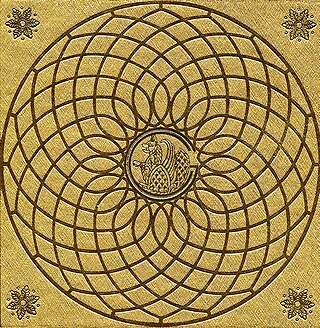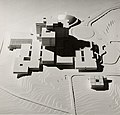Heydar Ghiai
Iranian architect (1922–1985) From Wikipedia, the free encyclopedia
Heydar-Gholi Khan Ghiaï-Chamlou (Persian: حیدرقلی خان غیایی شاملو; 23 October 1922 – 6 September 1985)[1] was an Iranian architect. He graduated from the École des Beaux-Arts in 1952, and was known as a pioneer of modern architecture in Iran. He designed the Senate House, the Royal Tehran Hilton Hotel, several train stations, cinemas, various civic and government buildings and the first series of state of the art hospitals. In France, he designed the Cité Universitaire aka Avicenne Foundation, amongst others.




In 1968, he was nominated architect to the imperial court of Iran and commissioned the vast project of a complex of imperial palaces situated in Farah Abad. As a professor of architecture at the University of Tehran, he taught several generations of architects.
Heydar Ghiaï-Chamlou was born in Tehran on 23 October 1922, decisively settled in France later, where he died on 6 September 1985 in Cap d'Antibes. The firm of Heydar Ghiaï & Associates has now been renamed Ghiaï Architects, based in San Francisco headed by his son Yves Ghiaï and his grand daughter Anahita Ghiaï.
Architectural philosophy
Quotes
- "Proportion is not a principle of architecture, but a principle of Life."[2]
- "Man has a basic need for certain shapes, imparted to him by his civilization and corresponding to his immediate needs. In them he discovers himself."[2]
- "I know a place where glass and concrete brush against the light, sparkling with delight."[2]
Distinctions
This section is empty. You can help by adding to it. (January 2019) |
List of projects
- Tehran Senate House
- Mashhad railway station
- Tabriz railway station
- Avicenne Foundation
- Tehran Pars Drive-In Cinema
- Cinema Radio City
- Cinema Moulin Rouge
- Royal Tehran Hilton Hotel
- Farah Abad Palaces
- Mashhad Hospital
- Lavizan Hospital
- Ghiai Palace
- Various Private Villas
Gallery
- Royal Hilton Hotel, Tehran
- Tehran Senate House
- House of Ghiai, Tehran
- Tehran Pars Drive-In Theatre
- Lavizan Military Hospital, Tehran
- Casino Tehran Pars, Tehran
- Mashad University Hospital, Mashad
- Mashad train station, Mashad
- Cinema Radio City, Tehran
- Cinema Radio City, Tehran
- Farah Abad Palace, Tehran
- Tabriz Railway Station, Tabriz
- Villa Nautica, Tehran
- Swan Lake Villa, Tehran
- Villa Oceania, Tehran
Artworks
This section is empty. You can help by adding to it. (July 2010) |
Bibliography
- J.I Cohen, M. Eleb & A. Martinelli, "The 20th century Architecture & Urbanism"; Paris, A+U, 1990, pp. 146–51
- F. Ghiai, " Yady az Heydar Ghiai", Rahavard, No.26, No27, No28, No29, Los Angeles, 1990-91-92-93, pp. 246–52, pp. 233–40
- M. Ghiai, Iran Senate House, Max Gerard Edt. Draeger Paris, 1976 ISBN 2-85119-008-3
- Architecture d'aujourd'hui, No.78, 1958, "Exposition et Hotel à Teheran", pp. 96–101
- Architecture d'aujourd'hui, No.84, 1959, Paris, "Palais des Arts à Teheran", pp. 16–17
- Architecture d'aujourd'hui, No.93, 1960, Paris, "Cinema en plein air à Teheran", pp. 20–21
- Architecture d'aujourd'hui, No.98, 1963, Paris, "Hôpital a Machad", pp. 33–34
- F. Bemont, "Teheran Contemporain", Art&Architecture, Teheran, No.17, 1973, pp. 85–88
- B. Oudin, Dictionnaire des Architectes, Paris, 1982, p. 187 ISBN 2-221-01090-6
- H. Stierlin, Iran des Batisseurs, "2500 ans d'Architecture", Geneva, 1971, p. 102
- Michel Ragon Histoire de l'architecture et de l'urbanisme modernes, éd.Casterman, Paris, 1986 ISBN 2-02-013290-7
- E. Yarshater, Encyclopædia Iranica, Volume X, New-York, 2001, p. 591-92
- R. Beny, "Iran elements of destiny", London, 1978, pp. 233, 265
- J.P. Roux, "Histoire des Turcs", Paris, 1984, pp. 253–54
- M. Akri, "Iran during the Pahlavi Era, Major political players", London, 1989, p. 392
- R. Ghirshman, Persia El reino immortal, London, 1971, p. 141
- Paris Match, "La Grandeur d'un Regne; le Senat Iranien", No.1448, Paris, 1977, p. 12
- Teheran Journal, "Downtown's Masterpiece", March 5, 1977, p. 6
- Architecture Méditerranéenne, No 46, "Résidence Royale", Marseille, 1995, pp. 195–97
- Architecture Méditerranéenne, No 51, "Maison Astrolabe", Marseille, 1998, pp. 230–31
- Architecture Méditerranéenne, No 52, "Chateau Golestan", Marseille, 1999, pp. 209–16
- Architecture Méditerranéenne, No 55, "From father to son, a dynasty of builders", Marseille, 2001, pp. 130–60
- Persian Heritage, No 19, "Like Father Like Son", New Jersey, 2000, p. 29
- Persian Heritage, No 21, "Interview with Farhad Ghiai", New Jersey, 2001, pp. 28–32
- Sun Coast Architect/Builder, Vol 58, No.6, "San Francisco Luxury Triplex", California, 1993, pp. 24–26
- Architectural Records, No.11, "Destination Architecture", New-York, 1998, pp. 110–11
- Kayhan, "Kakhe Golestan", London, Feb.24, 2000, p. 5
- Le Figaro, "Le Senat de Teheran", March 29, 1977, p. 28
- Jours de France, "Monde", June 21, 1965, p. 65
- Persian Heritage, " Mariette Ghiai, a leading Lady in Iran", Fariba Farhad, Vol.6, No.23, New Jersey, Fall 2001, p. 28
- teNeues, "San Francisco Houses", Loft Publications, Spain, Summer 2003, pp, 314-329
- California Masons, California, USA, Cover Story, March, 2004
- Diablo Publications, "The Palace Next Door", California, February 2004, p. 80
- Kayhan Newspaper, "Academic Medal for Yves Ghiai", London, May 13, 2003, p. 5
- Jean Royere "Decorateur a paris" page 40 p165 edition Norma
Notes
External links
See also
Wikiwand - on
Seamless Wikipedia browsing. On steroids.














